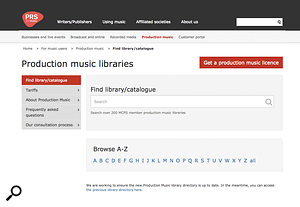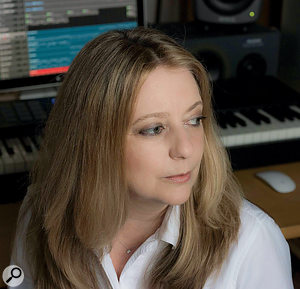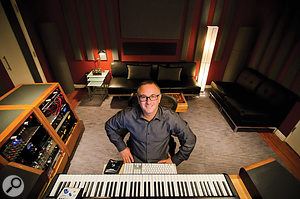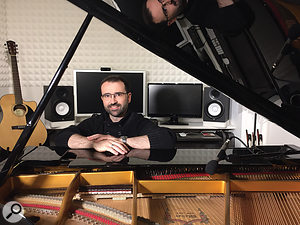Production music is rarely glamorous, but it can be very lucrative. In the first of a major new series, we explain how to get your foot in the door.
My name is Dan Graham, possibly best known to SOS readers as the co-owner of the Kontakt-based software company Gothic Instruments, who make the Dronar series. However, I’m also the writer of over 20 library music albums for major companies, and have founded six library music labels with offices in the UK and in LA. I have 13 years’ experience in the industry, and in this series of in-depth articles, I’m going to spill the beans on how it all works, explaining how you can make a good, stable, full- or part-time living out of it. I hope that existing library composers will also find much of interest, to help expand their knowledge and inspire them to try new avenues. In this first instalment, I’ll explain what library music is and offer some advice on how to get started.
What Is Library Music?
 Dan Graham is a successful composer and publisher of library music.Library music, also known as ‘production music’, is created mainly for video professionals working on TV shows, movie trailers, advertising and more. It’s not written for specific visuals but, instead, to (hopefully inspiring) album concepts, and distributed around the world where it can end up being be used in random ways. For example, for many years my highest-earning track was a five-second boom sound buried in a French Polynesian news theme, while my artistic opuses made peanuts.
Dan Graham is a successful composer and publisher of library music.Library music, also known as ‘production music’, is created mainly for video professionals working on TV shows, movie trailers, advertising and more. It’s not written for specific visuals but, instead, to (hopefully inspiring) album concepts, and distributed around the world where it can end up being be used in random ways. For example, for many years my highest-earning track was a five-second boom sound buried in a French Polynesian news theme, while my artistic opuses made peanuts.
Library music has a long and proud history that stretches all the way back to 1927, when the British company De Wolfe began making 78rpm albums for radio use. It was dominated by major labels until about the year 2000, but thanks to cheaper recording gear and the explosion of video content production, it has become more democratic, and there are now more composers, publishers and end users than ever — not to mention more high-quality music. Most of this is now accessed through online platforms used by millions of video-makers.
What’s In It For Me?
 Networking is invaluable, so get out there to industry events and meet other composers and publishers.Composing library music is unlikely to make you famous, but it might make you rich. If you were to spend six to eight years writing 50 or more high-quality tracks per year for good-quality labels, you could build up a royalty income of more than £100,000 per year, which would keep going long after you stopped writing. Even if you only compose library music as a sideline, it can also be a great way to add a stable new income stream, or be a stepping stone to becoming a full-time composer.
Networking is invaluable, so get out there to industry events and meet other composers and publishers.Composing library music is unlikely to make you famous, but it might make you rich. If you were to spend six to eight years writing 50 or more high-quality tracks per year for good-quality labels, you could build up a royalty income of more than £100,000 per year, which would keep going long after you stopped writing. Even if you only compose library music as a sideline, it can also be a great way to add a stable new income stream, or be a stepping stone to becoming a full-time composer.
Compared with many music-industry roles, library music is easier to get into and provides a more stable way to make a living. There is also usually more musical freedom than you would have writing film or TV scores for directors with vivid imaginations but terrible communication skills, and arguably more still than being in a band where managers, record labels, band members and fans will conspire to pollute your genius with baffling demands for hits.
 The PRS web site is a great starting point for researching library music publishers.Downsides include the difficulty of finding work and choosing the right companies to write for, the requirement to produce a large amount of excellent music, and an epic three-year delay while you wait for your money, which can invite pessimism and doubt from yourself and others. But that’s what this series is all about: how to overcome these obstacles.
The PRS web site is a great starting point for researching library music publishers.Downsides include the difficulty of finding work and choosing the right companies to write for, the requirement to produce a large amount of excellent music, and an epic three-year delay while you wait for your money, which can invite pessimism and doubt from yourself and others. But that’s what this series is all about: how to overcome these obstacles.
My Library Music Story
Today, I run six UK-based library music labels, making music for Hollywood movie trailers, TV and advertising around the world. Recent credits include a Star Wars: Rogue One trailer. It wasn’t always like that.
Back in 2004 I was on the dole in a terrible low-rent flat. Our band had been dropped by our label, and I was wondering if I’d have to get a real job. Despite my benefits adviser wanting me to be more realistic, as one last roll of the dice I Googled “How do you make money out of music?” and sent off literally thousands of emails with an album’s worth of solo piano music to every library publisher I could find.
Thanks to good demos and scattershot statistics I was offered three placements: one for a large UK library, one for a royalty-free library and one for a Czech library. This landed me in a couple of pickles. One was having to create another two albums to keep them all happy (I wrote 24 new tracks that week). The other was that without exactly lying, I used Steinberg’s The Grand while somewhat implying that it was a real grand piano, and nearly came unstuck when the major UK publisher asked me to fix “a loose bit of metal” that they could hear. Thankfully, a software update removed that pesky twang!
 All major library music publishers will have web sites of their own, which are perfect both for checking out what they already have, and for finding contact details.From there, one job led to another and I happily scraped a small living from advances until a magical thing began to appear: royalties. I was in my mid-’30s, had always been a poor songwriter writing for the love of music, and was now earning, as I saw it, 10 grand a year for nothing. I was pretty pleased with my lot. By 2008 the royalties grew, and I managed to afford a holiday. In 2010, with over 20 albums released, I earned over £100,000 and felt like a confused peasant who’d won the lottery with no idea what to do with it all.
All major library music publishers will have web sites of their own, which are perfect both for checking out what they already have, and for finding contact details.From there, one job led to another and I happily scraped a small living from advances until a magical thing began to appear: royalties. I was in my mid-’30s, had always been a poor songwriter writing for the love of music, and was now earning, as I saw it, 10 grand a year for nothing. I was pretty pleased with my lot. By 2008 the royalties grew, and I managed to afford a holiday. In 2010, with over 20 albums released, I earned over £100,000 and felt like a confused peasant who’d won the lottery with no idea what to do with it all.
At that point I had six years’ experience of the world library music system, so took a chance at funding some albums with live strings and choir and started my own movie trailer music company, named after my most successful track, ‘Gothic Storm’. With some detective work, I then put together a first-class worldwide agent network, and reinvested rising earnings into new niche labels until here we are today with six labels, 130 albums, sales offices in the UK and LA, and a great team trying to keep pace with the rapid expansion.
Why Am I Telling You This?
The point of the story is to demonstrate that if you’re a good composer and producer, and you are patient and hard-working, you can make a great living from library music, with a lot of artistic freedom. If you’ve hit a career dead-end or you’re just looking for a stable long-term income stream to offset uncertainty in your other work, this could be the solution to your problems.
In these articles I will give you a guide that I believe anyone who is good can follow to find success, so read on to learn more about a thriving music industry backwater that may well forever save you from your anti-music nemesis: a real job.
Finding Good Work
 I know from first-hand experience that library music can eventually earn you royalties of £100k+ per year. However, to achieve this, you need to find quality companies to write for. The worst companies are black holes that will take your music and give nothing back. Even the majority will only make you a small living, so you need to go on a treasure hunt for the golden geese — not because you are greedy, but because you might as well earn more than less for the same piece of music. A good place to start is this list of MCPS-registered UK libraries: www.prsformusic.com/users/productionmusic/libraries/pages/default.aspx.
I know from first-hand experience that library music can eventually earn you royalties of £100k+ per year. However, to achieve this, you need to find quality companies to write for. The worst companies are black holes that will take your music and give nothing back. Even the majority will only make you a small living, so you need to go on a treasure hunt for the golden geese — not because you are greedy, but because you might as well earn more than less for the same piece of music. A good place to start is this list of MCPS-registered UK libraries: www.prsformusic.com/users/productionmusic/libraries/pages/default.aspx.
From there, follow these tips to help you find the best labels:
- Start with large companies. They are hard to get work from, but can earn well, so are well worth trying. They include EMI Production Music (whose group includes KPM, Music House, Juce and Ded Good), Universal, Sony/Extreme, Sony/ATV, Bruton, West One Music Group, Warner/Chappell, Audio Network and BMG Zomba. However, be aware that some apparently large companies don’t do as well as others, while many smaller companies like mine also have good per-album sales.
 Look at their international networks. You’ll usually find information about overseas agents and offices on label web sites. If the labels have their own worldwide offices, they’re big. If they have good international agents (also known as ‘sub-publishers’) representing them, they are probably doing well — major labels such as Universal, Sony, EMI, Warner/Chappell and BMG all represent smaller labels in various territories. Successful independent agents include APM in the US, Upright Music in Scandinavia, Nichion Inc in Japan, Media Cube in South Korea, and Beatbox Music and Big Bang & Fuzz, both in Australia. In turn, the web sites of those agents are gold mines for further research, so make sure you also investigate the worldwide labels that they represent, the agents of those labels, the labels of those agents and so on, until you have a thorough knowledge of the world’s best labels and a large contact list.
Look at their international networks. You’ll usually find information about overseas agents and offices on label web sites. If the labels have their own worldwide offices, they’re big. If they have good international agents (also known as ‘sub-publishers’) representing them, they are probably doing well — major labels such as Universal, Sony, EMI, Warner/Chappell and BMG all represent smaller labels in various territories. Successful independent agents include APM in the US, Upright Music in Scandinavia, Nichion Inc in Japan, Media Cube in South Korea, and Beatbox Music and Big Bang & Fuzz, both in Australia. In turn, the web sites of those agents are gold mines for further research, so make sure you also investigate the worldwide labels that they represent, the agents of those labels, the labels of those agents and so on, until you have a thorough knowledge of the world’s best labels and a large contact list. Ask successful library composers. Some are cagey but many will be happy to help if they can see you are serious. Find composers on forums such as the Sound On Sound forum, in Facebook groups and at events hosted by organisations like BASCA and PRS. After a few free drinks, composers will blab about the saints and sinners. Ignore failures, who will tell you it’s all luck or a swindle, or even successful but paranoid composers who will try to put you off to discourage the competition. It happens — composers are nuts, as you know.
Ask successful library composers. Some are cagey but many will be happy to help if they can see you are serious. Find composers on forums such as the Sound On Sound forum, in Facebook groups and at events hosted by organisations like BASCA and PRS. After a few free drinks, composers will blab about the saints and sinners. Ignore failures, who will tell you it’s all luck or a swindle, or even successful but paranoid composers who will try to put you off to discourage the competition. It happens — composers are nuts, as you know.- Look at publishers’ web sites and listen to the amount and quality of the music, and the standard of the sleeve art. If the sites are well designed with lots of great music and impressive recent placements that’s reassuring, although tips from experienced writers are better.
 Consider their business model. Often, large libraries are ‘exclusive’, meaning they will want exclusive rights to your tracks; often, they will do better for you than non-exclusive, royalty-free libraries, but this definitely isn’t always the case, so again, seek tips from other writers. A later article in this series will go into detail about the rival business models out there and how they affect you.
Consider their business model. Often, large libraries are ‘exclusive’, meaning they will want exclusive rights to your tracks; often, they will do better for you than non-exclusive, royalty-free libraries, but this definitely isn’t always the case, so again, seek tips from other writers. A later article in this series will go into detail about the rival business models out there and how they affect you.
How To Approach Publishers
Having read this far, let’s assume you now you have a list of the best companies and some excellent music to play them. Now it’s time to make your all-important first approaches. Most composers approach companies badly, so get a head-start by following these dos and don’ts:
 Do: Use Google and publishers’ web sites to find a personal email address, and address your emails by name. Show that you’ve done research by referring to their releases, sub-labels or writers. Briefly name-drop your most impressive clients or achievements to establish credibility. Be polite, complimentary, brief and professional. Include a streaming link to 10-12 tracks that sound fantastic (as good and as professionally mastered as anything out there) and which would fit on their catalogues. If the tracks aren’t available for them, explain that they are previous examples and you would like to write new material for them.
Do: Use Google and publishers’ web sites to find a personal email address, and address your emails by name. Show that you’ve done research by referring to their releases, sub-labels or writers. Briefly name-drop your most impressive clients or achievements to establish credibility. Be polite, complimentary, brief and professional. Include a streaming link to 10-12 tracks that sound fantastic (as good and as professionally mastered as anything out there) and which would fit on their catalogues. If the tracks aren’t available for them, explain that they are previous examples and you would like to write new material for them.
Don’t: Write rambling emails explaining how great you are, or take a superior tone. Don’t write a bitter reply if you’re rejected. Don’t tell them if the music you’re sending was rejected by someone else — no one wants rejects. Don’t try to be funny — it usually sounds weird. Above all, never send crap music. If it’s badly played, written, recorded, mixed or mastered, with disembodied guitar solos and cheesy, fake-sounding samples, they’ll never forget.
 If you get no response, send a polite reminder every two weeks until they reply. Many will at least say ‘no thanks’. If they do this, courteously ask why, learn from it and send them something new a couple of months later. Politely persist where others quit.
If you get no response, send a polite reminder every two weeks until they reply. Many will at least say ‘no thanks’. If they do this, courteously ask why, learn from it and send them something new a couple of months later. Politely persist where others quit.
The ‘Finished Album’ Trick
The ideal thing to send to prospective publishers is a complete album of 12 brilliant finished tracks united by a genre or concept that would fit in their catalogue, ready to be signed over: Emotional Atmospheres, perhaps, or the can’t-fail Happy Plinky Plonky Whistling Banjos. This move (the finished album, not the banjos) worked for me, and has been successful for many writers submitting to my labels, because you are saving publishers the time and risk of developing an album concept of their own, and removing any doubt about whether you will do a good job or waste their time with endless rewrite requests. Submitting a fantastic, ready-to-go album, therefore, takes you straight to the front of the queue ahead of their favourite writers.
 Getting your foot in the door is not just about having brilliant music to offer, but putting in the hard work to contact as many publishers as possible.If several companies accept your album, choose one and apologise to the others, explaining that it is now taken but you’d love to develop a similar album to offer them.
Getting your foot in the door is not just about having brilliant music to offer, but putting in the hard work to contact as many publishers as possible.If several companies accept your album, choose one and apologise to the others, explaining that it is now taken but you’d love to develop a similar album to offer them.
How Does Library Music Make Money?
The production music business can seem a bit opaque, so if you’re curious about how much money can be made, when it will arrive and where from, here’s a guide.
As to how much you can expect to earn, there are so many variables in play that you could be forgiven for falling for the myth that it’s a lottery — as some unsuccessful composers will have you believe. Just a few of the factors affecting income include: how clear the album concept is; how good the track titles are; what reputation the company has; how good their sales and marketing are; how good their international agent (sub-publishing) network is; how good the metadata is (the track descriptions created by the publisher to help with search engines); the position of the track in the track list (early tracks earn more); how well the world economy is doing; whether the genre of the album is in demand; luck (maybe your track will end up as a hit TV show theme tune); the state of the library music industry; the business model of the company and the terms of the deal you have. At times you might wonder whether the quality of your music even has an influence, but trust me, it does: good music earns more, and if you make bad music, your opportunities will soon dry up.
 If all goes according to plan, you can expect your career earnings to follow this sort of trajectory.However, while all of these things have a huge and unpredictable influence on the success of any given track, the more tracks you make, the more consistent the overall picture will be. Do enough great tracks for great companies, and you’ll see the uncertainty evaporate and clear earnings-per-album statistics emerge. In fact, you should expect an average of £5000 per year per album in combined broadcast (PRS) and sync/mech income. And for each album, you should expect this to hit its stride in three years and dwindle after 10 years. So that’s £50,000 in total per album. Write 20 of those beauties and you’ve made your future self a million quid. ‘Cheers, old self,’ you’ll say, gloating in your 2027 driverless swimming pool.
If all goes according to plan, you can expect your career earnings to follow this sort of trajectory.However, while all of these things have a huge and unpredictable influence on the success of any given track, the more tracks you make, the more consistent the overall picture will be. Do enough great tracks for great companies, and you’ll see the uncertainty evaporate and clear earnings-per-album statistics emerge. In fact, you should expect an average of £5000 per year per album in combined broadcast (PRS) and sync/mech income. And for each album, you should expect this to hit its stride in three years and dwindle after 10 years. So that’s £50,000 in total per album. Write 20 of those beauties and you’ve made your future self a million quid. ‘Cheers, old self,’ you’ll say, gloating in your 2027 driverless swimming pool.
When Will I Get Paid?
Gratification for the library music composer tends to be very delayed indeed. A ‘three year rule’ means you typically need to wait this long for income to filter through the international royalty system. Delays include: your publisher sitting on your music before release, their sub-publishers sitting on it, everyone being slow to register tracks with performing rights organisations, clients being slow to audition it and warm to it, clients being slow to fill out cue sheets, a delay between the music being used and the show being broadcast, foreign sub-publishers sitting on the money for months before paying your publisher, your publisher sitting on it before paying you, foreign performing rights societies sitting on the money before paying PRS and them sitting on it before paying you. So, it’s a three-year chain between you finishing your mixes and being paid, linked by a lot of money-sitting and slow-pokes.
The upsides of this lengthy delay include earnings filtering through for a long time after you finish each album, and impatient rival composers giving up and doing other things while you smartly keep on writing new music in the meantime. The graph shows how your earnings should build over 15 years assuming typical income, four excellent albums of 12 tracks per year for good labels, and a three-year income delay.
Where Does The Money Come From?
 “My first PRS cheque — and a telegram from the Queen, on the same day!”As with commercial music, there are two main sources of income: synchronisation/mechanical income on one side and performance (broadcast) income on the other. A full explanation is outside the scope of this article, but a simplified version is that synch/mech money is made when a video producer pays to license your music for a project, whereas performance (broadcast) income is paid when your track is aired on TV and paid by the TV network to the performing rights organisation (PRS in the UK). Your publisher usually pays you your share of sync/mech income twice yearly, in March and September, and PRS pays you four times a year: usually larger amounts in April and October and smaller amounts in July and December.
“My first PRS cheque — and a telegram from the Queen, on the same day!”As with commercial music, there are two main sources of income: synchronisation/mechanical income on one side and performance (broadcast) income on the other. A full explanation is outside the scope of this article, but a simplified version is that synch/mech money is made when a video producer pays to license your music for a project, whereas performance (broadcast) income is paid when your track is aired on TV and paid by the TV network to the performing rights organisation (PRS in the UK). Your publisher usually pays you your share of sync/mech income twice yearly, in March and September, and PRS pays you four times a year: usually larger amounts in April and October and smaller amounts in July and December.
The relative amounts of the two income streams depend on many things, including the type of music — for example, Hollywood trailer music earns more sync and less broadcast than more TV-friendly music — and your publishing deal; if you’re on a 50-percent split of sync/mech income, you’ll get twice as much as if you were on a 25-percent split. From my experience as a writer and publisher, a good rule of thumb is that performance (PRS) income will be roughly equal to synch/mech income if you’re on a 50-percent split.
Other sources of income include advances and fees: a publisher may offer you an advance on your future mech/sync income, though this is much less common now than it used to be. In the US, it’s more common to get a ‘buyout’ fee in return for giving up your share of sync/mech income. A later article will go into more depth about the types of deals on offer, but an important takeaway for now is that working for a company who gives you a small or zero share of sync/mech income (not uncommon) is only a good idea if they make up for it by providing great performance income — the bigger and more successful companies will do this, so definitely don’t rule those deals out.
What Could Possibly Go Wrong?
 Happy Plinky Plonky Whistling Banjos: works every time.In this article, I’ve deliberately emphasised the positives. You’ve heard that great money can be made and that library music can be a flexible and artistically fulfilling area to work in.
Happy Plinky Plonky Whistling Banjos: works every time.In this article, I’ve deliberately emphasised the positives. You’ve heard that great money can be made and that library music can be a flexible and artistically fulfilling area to work in.
However, it isn’t for everyone. Your music has to be excellent to persuade experienced publishers to keep giving you work. Even successful writers get a lot of rejections and have their emails ignored when they write to new publishers. You need to find the time to create an enormous amount of quality music for years before you start to make a decent living. To sustain that, you need alternative sources of income or a willingness to work in poverty, and a very optimistic attitude in the face of naysayers who will exacerbate your own doubts about your chances of getting to the point where you have hundreds of great tracks placed with great publishers, at which point income becomes high and stable.
All of these obstacles are regularly overcome by thousands of library music writers — so rather than be put off, you should be encouraged that it’s not for everyone, because that means that the industry isn’t swamped with brilliant competitors, and there are still plenty of new opportunities for talented composers.
Next month, I’ll explain all about business models, deals and the international scene. Until then, time to get to it — and don’t stop until you’ve sent out thousands of emails with amazing music links!
All About Library Music: Part 1 Getting Started
All About Library Music: Part 2 The Business
All About Library Music: Part 3 The Composer
All About Library Music: Part 4 The Client
Library Music Get-Rich-Slow Plan
- Compile 10-12 excellent previous tracks or new submissions on a streaming service such as SoundCloud.
- Research great companies and send them links with well-written, personalised emails.
- Write four albums of approximately 12 tracks each per year.
- After three years, watch the cash start to trickle in.
- After 10 years, bitch about the pressures of wealth and start to feel angry about tax.
Words Of Encouragement
 Ehren EbbagePhoto: Dmitri von Klein“Writing library music allows me to work from home and watch my daughter grow, which is something many music professionals sacrifice. I can live wherever I choose. After so much time spent pursuing other music career paths, I feel like I’ve found a dream situation.” Ehren Ebbage (Vanacore, Warner/Chappell, Marmoset Music)
Ehren EbbagePhoto: Dmitri von Klein“Writing library music allows me to work from home and watch my daughter grow, which is something many music professionals sacrifice. I can live wherever I choose. After so much time spent pursuing other music career paths, I feel like I’ve found a dream situation.” Ehren Ebbage (Vanacore, Warner/Chappell, Marmoset Music)
 Marie-Anne Fischer“Every new brief brings with it an extension of new skills. Even after writing many tracks I still feel the excitement when I receive the live string parts back from the recording studio.” Marie-Anne Fischer (Library Of The Human Soul, Gothic Storm, Synctracks)
Marie-Anne Fischer“Every new brief brings with it an extension of new skills. Even after writing many tracks I still feel the excitement when I receive the live string parts back from the recording studio.” Marie-Anne Fischer (Library Of The Human Soul, Gothic Storm, Synctracks)
 Clive Lukover“I find with production music I have greater creative freedom to write exactly the kind of music which inspires me. The royalties that come through do eventually become a sustainable income.” Clive Lukover (Sony/ATV, Intervox, No Sheet Music)
Clive Lukover“I find with production music I have greater creative freedom to write exactly the kind of music which inspires me. The royalties that come through do eventually become a sustainable income.” Clive Lukover (Sony/ATV, Intervox, No Sheet Music)
“Doing library music early in your career is a fantastic way to commit to output a lot of music, which is the best way to hone your skills.” Mike Rubino (X-Ray Dog)
 Mike Rubino“Learning to immerse yourself in a brief or a concept for an album is hugely helpful for creativity.” Kyle Kniceley (Gothic Storm, Position Music, Dos Brains, Theta Sound Music, Cypher TM)
Mike Rubino“Learning to immerse yourself in a brief or a concept for an album is hugely helpful for creativity.” Kyle Kniceley (Gothic Storm, Position Music, Dos Brains, Theta Sound Music, Cypher TM)
 Kyle Kniceley“As well as a stream of regular income and a series of fresh, interesting and challenging briefs, library music has given me the opportunity to work with some fantastic people — to collaborate on writing and production, provide employment for session-musician friends, and even record several times a year with 40-50 piece orchestras across Europe. Being nominated for a Production Music Award this year was an unexpected bonus, and that led to me making many new friends and commissions for several companies I hadn’t worked for before.” Jamie Salisbury (EMI/Cavendish, KPM, Library Of The Human Soul)
Kyle Kniceley“As well as a stream of regular income and a series of fresh, interesting and challenging briefs, library music has given me the opportunity to work with some fantastic people — to collaborate on writing and production, provide employment for session-musician friends, and even record several times a year with 40-50 piece orchestras across Europe. Being nominated for a Production Music Award this year was an unexpected bonus, and that led to me making many new friends and commissions for several companies I hadn’t worked for before.” Jamie Salisbury (EMI/Cavendish, KPM, Library Of The Human Soul)
 Jamie Salisbury“I didn’t believe I could earn a credible income from library music until my first four-figure PRS statement. More inspired than ever to continue my pace of writing 40-50 tracks a year.” Oliver Sadie (Library Of The Human Soul, Gothic Storm)
Jamie Salisbury“I didn’t believe I could earn a credible income from library music until my first four-figure PRS statement. More inspired than ever to continue my pace of writing 40-50 tracks a year.” Oliver Sadie (Library Of The Human Soul, Gothic Storm)
 Oliver Sadie
Oliver Sadie AudioAndroid.“Library is hard work and can take years to get rolling, but in the long play it’s a great way for a composer to build a solid foundation of copyrighted works. If well written and signed to the right publisher/library, these tracks should go on to earn you an income over their life of copyright, which should be a minimum of 20 years. Whilst your work is out there earning for you, you are free to focus on other things... Like, for instance, taking over the world with your new robot army!” AudioAndroid (various major publishers)
AudioAndroid.“Library is hard work and can take years to get rolling, but in the long play it’s a great way for a composer to build a solid foundation of copyrighted works. If well written and signed to the right publisher/library, these tracks should go on to earn you an income over their life of copyright, which should be a minimum of 20 years. Whilst your work is out there earning for you, you are free to focus on other things... Like, for instance, taking over the world with your new robot army!” AudioAndroid (various major publishers)
 Gabriel Brosteanu“Just have patience, lots and lots of patience. I think it’s the most important thing, and it also helps you to not give up too early! Otherwise, writing library music is really great, diverse and also offers some creative musical freedom! It can also help switch a career pathway entirely, as it did in my case going from playing in bands to making a living from writing music.” Gabriel Brosteanu (Library Of The Human Soul)
Gabriel Brosteanu“Just have patience, lots and lots of patience. I think it’s the most important thing, and it also helps you to not give up too early! Otherwise, writing library music is really great, diverse and also offers some creative musical freedom! It can also help switch a career pathway entirely, as it did in my case going from playing in bands to making a living from writing music.” Gabriel Brosteanu (Library Of The Human Soul)

